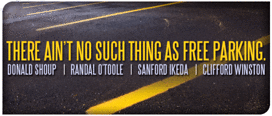The conceptual basis for parking charges is sound but further serious discussion requires careful and detailed empirical analysis of the efficiency and distributional effects of the policy. I appreciated Professor Shoup’s references to empirical research that has assessed the effects of minimum parking requirements. I hope to see similar work assessing parking charges in the future, or a promising area of policy analysis and perhaps adoption will either be ignored or degenerate into advocacy.
Further Research Is Needed to Advance the Conversation about Parking Charges
Also from this issue
Lead Essay
America’s supposed love affair with the automobile is more like an arranged marriage, says Donald Shoup. Car and parking policies make cities and suburbs less livable for human beings. He recommends three reforms: First, adjust parking meter prices according to supply and demand. Second, return parking revenue to local communities for civic improvement. And third, remove minimum parking requirements that lock up useful land, lengthen commute times, and contribute to urban and suburban sprawl. These policies, he argues, are good for the community, good for the environment, and represent sound, market-based urban planning.
America’s supposed love affair with the automobile is more like an arranged marriage, says Donald Shoup. Car and parking policies make cities and suburbs less livable for human beings. He recommends three reforms: First, adjust parking meter prices according to supply and demand. Second, return parking revenue to local communities for civic improvement. And third, remove minimum parking requirements that lock up useful land, lengthen commute times, and contribute to urban and suburban sprawl. These policies, he argues, are good for the community, good for the environment, and represent sound, market-based urban planning.
Response Essays
Randal O’Toole argues that the automobile brings mobility to the common people in a way they could never have otherwise. As such, it is a great social good, and those who criticize urban sprawl are neglecting the many good things about our highly mobile contemporary lifestyle—among them better housing, higher labor productivity, and better access to consumer goods. These may well be worth the commute.
Some parking subsidies, such as minimum parking requirements and cheap on-street parking, should indeed be removed. But using parking fees to subsidize local public works projects simply redistributes the automobile subsidy to local landowners. O’Toole proposes to privatize parking; private entities would then use the money they collected to build additional parking in response to consumer demand.
Sanford Ikeda calls Shoup’s proposal “an important, and presently… politically feasible step in the right direction.” He contrasts it favorably to congestion pricing, which represents, to him, a needless added layer of regulation. He recommends several refinements to Shoup’s thesis and situates it in a larger constellation of free-market transit policies, including especially deregulated private conveyances. Moving toward these policies, Ikeda argues, should be the ultimate goal.
- Efficient Road Pricing for Stationary Vehicles: The Case for Curb Parking Charges by Clifford Winston
Clifford Winston offers a variety of suggestions for further research and implementation of optimal parking charges. What are the current shares of various types of parking capacity? How much of it actually is free right now? How would congestion fees on roads interact with efforts to price parking efficiently? What can new information technologies offer us in this area? Although Winston is clearly sympathetic to Shoup’s thesis, his essay points to the magnitude of work yet to be done.

